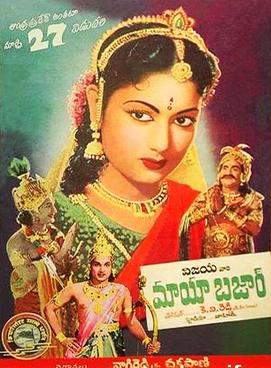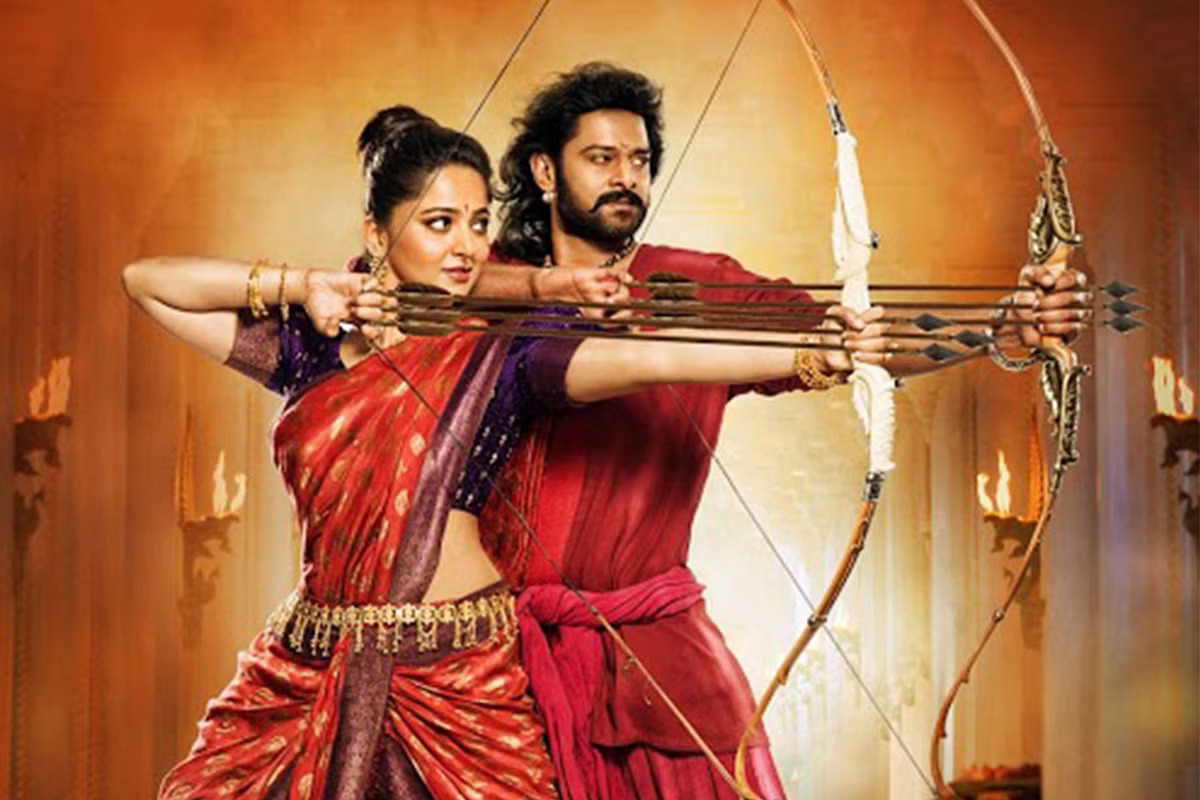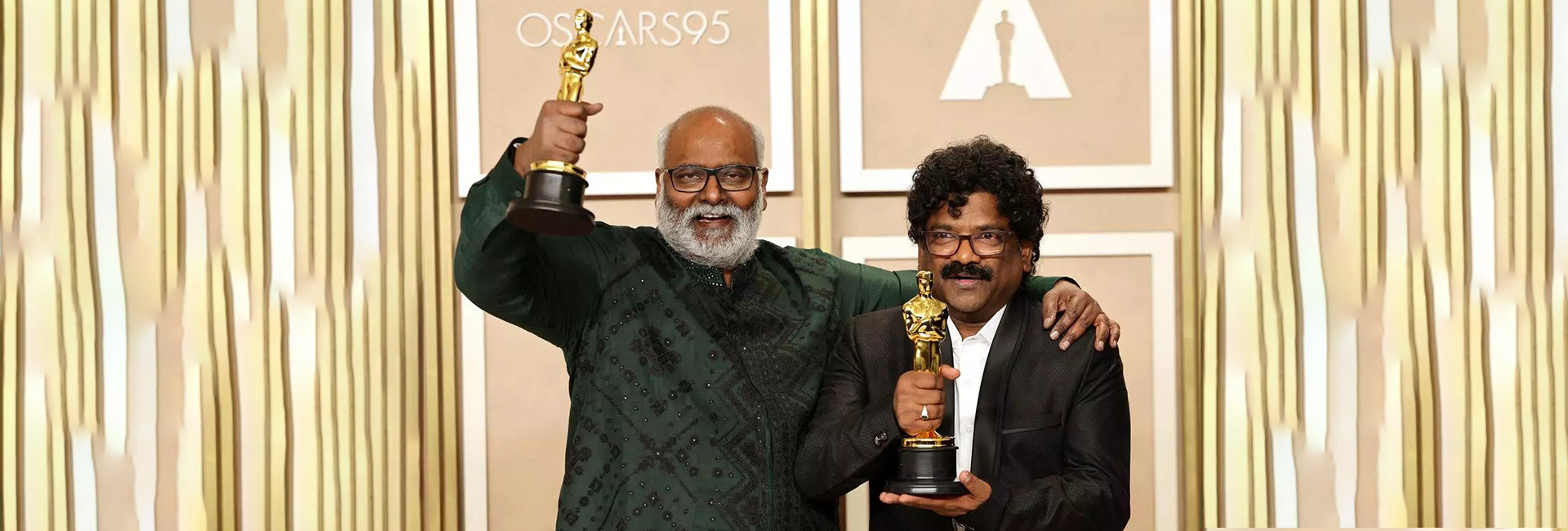(May 26, 2023) “There was only one wish on my mind. … RRR has to win, pride of every Indian, and must put me on the top of the world,” is how music composer MM Keeravani accepted his Oscar for Best Original Song Naatu Naatu. But this wasn’t a speech, instead a rendition of the popular 70s pop hit Top Of The World by the Carpenters that he crooned to a full house. This is how the first-ever Oscar for a Telugu film, RRR, was accepted amid a thunderous applause and a standing ovation. The epic moment has now turned into a beautiful memory for Telugu cinema lovers forever, thanks to director SS Rajamouli.
Pushing the envelope and scripting history has become synonymous with the filmmaker whose epic action drama RRR got a deafening response at the 96th Academy Awards. So much so that even Steven Spielberg, who Rajamouli calls the God of filmmaking, couldn’t help but laud the film. “I thought your movie was outstanding. I couldn’t believe my eyes, for me, it was like eye candy,” he said, adding, “It was a beautiful visual style and extraordinary to look at and experience.”
Shot in 320 hours across three years, the three-hour long Telugu action drama caught the attention of American viewers in the summer of 2022, when it got a US-wide release in over 100 theatres. Dylan Marchetti of Variance Films (the distributor of the film in the US) told a daily, “With more than 250 films coming out of India annually, RRR could be a gateway drug.” And it did emerge as one.
The visuals, impressive storytelling, songs, dance and jaw-dropping action turned out to be West’s introduction to not just Indian cinema but Tollywood. “This happened to be the film that broke all of the barriers,” Ram Charan told Deadline about the film, which has found a new level of global success which only strengthened with the release of the Hindi-dubbed version on Netflix with English subtitles. Such has been the admiration that it helped Rajamouli win Best Director at the New York Film Critics Circle Awards, and later bagged a Golden Globe and an Oscar for the song Naatu Naatu.
Swiftly, there has been a new wave of awareness in the West about Indian cinema’s artistic potential. While Bollywood films like Dangal and Bajrangi Bhaijaan have been popular overseas, it’s a first for Telugu cinema to break the glass ceiling. Telugu cinema’s global appeal can be attributed to its exceptional craftsmanship, breathtaking visuals, and soul-stirring music. Filmmakers have masterfully blended entertainment with thought-provoking narratives, addressing social issues and stimulating meaningful discussions.
Evolution of Telugu cinema
The roots of Telugu cinema can be traced back as early as 1921 when the first Telugu silent film, Bhishma Pratigna, by Raghupathi Venkaiah Naidu (known as the father of Telugu cinema), was released. The industry grew steadily, and by the 1950s, Telugu cinema had established itself as a major film industry in India. The emergence of iconic actors and directors such as NT Rama Rao, Akkineni Nageswara Rao, and BN Reddy contributed significantly to its growth.

The poster of Mayabazar
Over the years, Telugu cinema underwent several transformations, adapting to changing trends and incorporating technical advancements. The introduction of sound in the 1930s revolutionised the industry, leading to the production of talkies. The 1980s witnessed a shift towards commercial cinema, with larger-than-life storytelling and high-energy performances. This era saw the rise of superstars like Chiranjeevi and Nagarjuna, who garnered a massive fan following.
Scaling global heights
It was in the early 50s that Telugu cinema had its first tryst with international film festivals, when the talent and stories of Tollywood were showcased at global platforms. Films like Patala Bhairavi (1951), Mayabazar (1957) and Nartanasala (1963) were appreciated at the Indonesian Film Festival, followed by the 1976 film Seeta Kalyanam that enthralled audiences at the London Film Festival. In the 80s, Telugu cinema landed at Cannes Film Festival and Moscow Film Festival with films like Meghasandesam (1982) and Swayamkrushi (1987) taking the baton forward.

A still from Baahubali: The Conclusion
But it’s in the recent years that Telugu cinema has garnered significant attention on the global stage, owing to its grand-scale productions, compelling storytelling, and technical brilliance. The axis tilted in 2015 when SS Rajamouli presented Baahubali: The Beginning to the world. It made the global audience sit up and take notice of the creative potential that Telugu cinema holds. This was exacerbated by the phenomenal response to the 2017 film Baahubali: The Conclusion which brought Telugu cinema to the forefront of international recognition. The franchise shattered box-office records and captivated audiences worldwide with their stunning visual effects, gripping narratives, and powerful performances. Interestingly, Baahubali: The Conclusion became the first Indian film to cross ₹1000 crore at the box office, thanks to its release in countries like the US, Canada, New Zealand, Fiji, Malaysia, Russia and China.
The impact of Telugu cinema
The success of Baahubali franchise opened doors for Telugu cinema to reach wider audiences across various languages and cultures. Its massive international success showcased the industry’s potential to create content with universal appeal.

SS Rajamouli and MM Keeravani meet Steven Spielberg
RRR further solidified the global impact of Telugu cinema. The film, set in the pre-independence era, struck the right chord with the audiences worldwide for its gripping storytelling, powerful performances and exceptional production values. Interestingly, it was the long duration, songs and dance which kept the Westerns away from Indian films for the longest time, and now it’s exactly these things that brought them to RRR. “Some Indian filmmakers came to understand the power of song and dance, if it makes the story go forward, rather than stopping the story. Very few Indian filmmakers have figured out how to do that, but when that happens even Westerners will enjoy it,” SS Rajamouli told The New Yorker.
That’s why Naatu Naatu winning an Oscar and a Golden Globe can be easily called a watershed moment for Telugu cinema. It highlighted the industry’s ability to create music that transcends cultural and linguistic boundaries. This recognition not only celebrated the talent of the composers, lyricists, and singers but also served as a testament to the global reach of Telugu cinema.
Over the years, Telugu cinema’s impact has gone beyond just box-office numbers and awards. It has inspired filmmakers around the world to explore new possibilities and push creative boundaries. The success of films like Baahubali and RRR has instilled a sense of pride and enthusiasm among Telugu filmmakers and audiences alike, fostering a vibrant and innovative film ecosystem.
In conclusion, Telugu cinema’s impact on the world is undeniable. Its ability to captivate the mind and heart of a global audience through its captivating storytelling, memorable characters, and powerful emotions is a testament to the industry’s creative brilliance. With its continuous evolution and growing international recognition, Telugu cinema is poised to shine even brighter, inspiring and enchanting audiences around the world for years to come.




